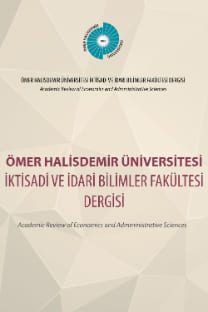Neoliberal Gıda Rejimi ve Çin'de Gıda Güvencesi:Ekonomi Politik Bir Perspektif
İnsanlığın gıda üretimi ve lojistiği alanında gösterdiği tüm ilerlemeye karşın gıda güvencesi önemli bir sorun olarak varlığını sürdürmektedir. Ulaşılan üretim düzeyinin bu sorunu kalıcı biçimde çözmesi mümkün olmakla birlikte, can kayıplarının ve yetersiz beslenmeden kaynaklanan hastalıkların önü alınamamaktadır. Bu çalışmada öncelikle gıda güvencesi kavramı ve bileşenleri ele alınmaktadır. Gıda güvencesi kavramına yüklenen ideolojik içeriğe vurgu yapılmakta, kavramın yürürlükteki gıda rejimi ile olan ilişkisi incelenmektedir. Çalışmanın ikinci kısmında , dünyanın en kalabalık ve hızlı büyüyen ülkesi olan Çin’in gıda güvencesini sağlama yolunda aldığı mesafe ve izlediği strateji ortaya konulmaktadır.
Anahtar Kelimeler:
gıda güvencesi, yetersiz beslenme, gıda rejimi
Neoliberal Food Regime and Food Security in China: The Political Economy Perspective
Despite all the progress that humanity has made in the area of food production and logistics, food safety remains an important problem. Although the level of production reached is enough to solve the problem permanently, deaths and diseases caused by malnutrition can not be prevented. In this study, firstly the concept of food safety and its components are discussed. The ideological content of the concept of food safety and the relationship with the current food regime are examined. In the second part of the study, China, the world's most populous and fast-growing country, the distance it has taken and its strategy to ensure food security are assessed.
Keywords:
Food security food regime, malnutrition, agriculture reform in China,
___
- Araghi F. (2003) “Food Regimes and the Production of Value: Some Methodological Issues”, Journal of Peasant Studies, 30 (2), 41-70.
- Ash R.F. (1988) “The Evolution of Agricultural Policy”, The China Quarterly, 116, 529-555.
- ASTI (2012) China: Country Note, July, Rome: IFPRI.
- Chung K. vd. (1997) Identifying the Food Insecure: The Application of Mixed Method Approaches in India, International Food Policy Institute, Washington D.C.
- Clapp J. (2004) “WTO Agricultural Trade Battles and Food Aid”, Third World Quarterly, 25,8, 1439-1452.
- Credit Suisse (2015) Global Wealth Report, Zurich: Credit Suisse AG.
- Dernberger R.F. (1999) “The People's Republic of China at 50: The Economy”, The China Quarterly, 159, 606-615.
- Economist Intelligence Unit (2016a) Global Food Security Index, Country Profile, http://foodsecurityindex.eiu.com/Country/Details#China (09.12.2016)
- Economist Intelligence Unit (2016b) Global Food Security Index: An annual measure of the state of global food security, London&New York: The Economist Intelligence Unit Limited.
- Fairbairn M. (2010) “Framing Resistance: International Food regimes and the Roots of Food Sovereignty”, Food Sovereignty: Reconnecting Food, Nature and Community içinde, H.Wittman vd. (Eds.), NS: Fernwood, 15-32.
- ISSN: 2564-6931
- Yayın Aralığı: Yılda 4 Sayı
- Başlangıç: 2008
- Yayıncı: NİĞDE ÖMER HALİSDEMİR ÜNİVERSİTESİ
Sayıdaki Diğer Makaleler
XVI. Yüzyıl Fransa’sında Vergiler ve Vergi İsyanları
Küresel Dengesizlikler: 1996-2008
AR-GE Harcamaları ve Ekonomik Büyüme Arasındaki İlişki: Türkiye Örneği
Şebnem TAŞ, İzzet TAŞAR, Yunus AÇCI
Dynamical Relationship Between Economical Growth and External Debt The Case of Turkey: (1987-2014)
Serdar ÖZTÜRK, Nazife Özge KILIÇ
Özel Hastanelerin Karşılaştığı Finansal Sorunların Tespiti ve Çözüm Önerileri
Nuri ÖMÜRBEK, Hande EREN, Okan DAĞ
Beşeri Sermaye ve Ekonomik Büyüme Arasındaki İlişki: Türkiye Örneği
Merve GÜLEN ALPAY, İlker SAKINÇ
Neoliberal Gıda Rejimi ve Çin'de Gıda Güvencesi:Ekonomi Politik Bir Perspektif
